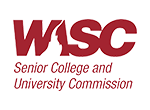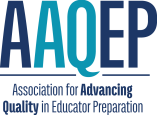
Education Specialist
in E-Learning (EdS)
Courses start every Monday
Take the first step in your National University journey
200k+ Alumni Worldwide
Overview
The latest devices and techniques for electronic learning present a powerful toolkit of educational opportunities, whether applied in the classroom, over long distances, or as a supplement to class instruction. This EdS specialization provides professional educators with the most current research and practices for integrating curriculum development, instructional design, and course delivery using technology and online learning management systems. The coursework provides a foundational knowledge in communication, leadership, and research techniques, while the specialty studies allow you to explore and improve the strategies, practices, applications, and accessibilities related to electronic teaching and learning experiences.

The Western Association of Schools and Colleges (WASC) accredits public and private schools, colleges, and universities in the U.S.

Admission Requirements
A conferred post-baccalaureate master’s degree or doctoral degree from a regionally or nationally accredited academic institution or an international institution determined to be equivalent through an approved evaluation service.
Courses
The Education Specialist (EdS) program requires two foundational courses, two research courses, six specialization courses, and one capstone course for a total of 33 credit hours. Both the Education Specialist (EdS) and Educational Specialist in Educational Leadership (EdS-EdL) require that all other courses be completed prior to starting the capstone course. The estimated time needed to complete this program is 23 months.
Course Details
Course Listings
Your communication abilities have a big influence on your professional reputation. In this course, you’ll develop skills to establish yourself as a competent professional with strong communication skills. You’ll learn competencies related to written, oral, and visual forms of communication appropriate to specific media and audiences. You’ll also explore how the iterative nature of preparing communications and integrating feedback into your work products can support your development and advancement as a professional.
Leadership during times of change can be challenging. This course supports your professional development as an effective leader of educational organizations during periods of change. You’ll explore strategies and techniques for self-reflection, evaluating culture, integrating stakeholder feedback, and incorporating data as part of improvement processes. To conclude the course, you’ll synthesize these skills to design a comprehensive improvement plan that addresses a specific problem within an educational organization.
This course introduces you to the research process by exploring its underpinnings, examining its paradigms, and investigating the foundations of qualitative and quantitative methodologies used in educational studies. You’ll identify criteria for the development of quality research studies that are ethical, accurate, comprehensive, cohesive, and aligned. Specific course topics involve the ethics of conducting research; data collection and analysis techniques; and issues of feasibility, trustworthiness, validity, reliability, transferability, and rigor. The goal is to familiarize yourself with the concepts and skills associated with conducting theoretical and applied research.
Select One of the Following Two Research Courses:
A focus on qualitative research methodology and the designs and methods used to collect and analyze data in educational research. You’ll examine the principles of qualitative research and explore commonly used designs (also referred to as qualitative traditions or genres) with a focus on application and feasibility. Qualitative data collection and analysis methods will be examined for their suitability with regard to the research design selected. Alignment between qualitative designs and research methods, issues of trustworthiness, and the responsibilities of the qualitative researcher will also be explored.
An exploration of quantitative research methodologies and associated designs and methods. You’ll examine paradigmatic perspectives along with the tenets and conventions of quantitative research. Topics for examination include feasibility, validity, reliability, variable operationalization, inferential designs, and analytic software applications used within the quantitative research paradigm. You’ll also look at the components of quantitative research designs that support meaningful studies within the field of education.
As the capstone to your EdS studies, you’ll work with a specific educational program relevant to your current or future professional aims. You’ll review the related literature and evaluate data to inform your development of potential solutions and future areas of research related to your identified problem. Finally, you’ll reflect on your personal learning journey throughout the EdS program.
Specialization Courses
EL-7001 Principles and Practices in E-Learning
In this course, you’ll be introduced to the essential elements in the e-learning field, including foundational philosophies, principles, and models. You’ll also consider technologies that increase student success while examining assessment practices and tools specific to the e-learning environment. The goal is to prepare you to use research-based best practices in creating positive e-learning experiences for learners and instructors.
EL-7002 E-Learning Instructional Strategies
An introduction to instructional learning strategies through the use of information and communication technologies. This course teaches you to develop effective online learning facilitation skills, such as establishing a safe learning environment, accommodating various learning styles, conducting effective online class discussions, monitoring the progress of e-learners, guiding e-learning collaborations, and administering online assessments and evaluations.
EL-7003 Instructional Design and Engaging E-Learning Activities
In this course, you’ll explore instructional design and its role in creating engaging e-learning experiences. Specifically, you’ll interpret existing standards for learner engagement and instructional design, explore design models for engaging e-learning activities, and actually design instructional content for e-learning experiences. You’ll also evaluate measures of e-learner engagement and recommend strategies for increasing that engagement within education and training contexts.
EL-7004 The Online Learner
This course considers key issues and practical guidance for working with students in an e-learning environment. It includes an examination of the basic characteristics of online students and the factors that are critical to their success. You’ll also explore student-centered approaches, engagement that supports equity and inclusion, and assessment strategies for improving e-learning.
EL-7006 Facilitating Adult Learning Online
Adult learners have unique needs, and this course will prepare you to facilitate online learning to meet them. You’ll examine adult learning theories, principles, and pedagogies with particular consideration for diversity, equity, inclusion and adult motivation. You’ll also consider how to design online learning experiences that present the best opportunities for adult learning.
EL-7007 Developing Online Content Ethically and Legally
In this course, you’ll examine the ethical and legal implications of developing online content. You’ll consider the different ways content is distributed and protected, and you’ll review the individual and collective implications when laws and best practices are not adhered to. You’ll also explore various ethical challenges and the need to consider multiple aspects of content accessibility. The goal is to prepare you to develop online content ethically and legally across all e-learning contexts.
EL-7700 Leading Online Learning for K-12 Students
This course offers a broad overview of e-learning in K-12 education. You’ll examine opportunities, challenges, and best practices, including communication tools, necessary technologies, and related resource implications. You’ll also consider e-learning needs related to equity, accessibility, and the ability to modify content for online delivery.
ED-7009 Educating a Diversity of Learners
Because today’s learners differ in gender, sexual orientation, age, cultural background, experiences, and abilities, today’s educators must be able to appraise, assess, and argue the best means to reach such a variety. In this course, you’ll explore different means to address the nature of cultural diversity, its sources, and its importance to educators. You’ll also consider how districts can plan and prepare to meet the needs of diverse students, taking into consideration epistemological and axiological perspectives unique to many cultures.
Learning Outcomes
- Develop skills to support educational practices across diverse instructional and organizational settings
- Communicate with diverse audiences about educational theories, research, and practices
- Analyze professional skills, dispositions, and technology options for learning and educating diverse groups
- Apply evidence-based solutions for addressing educational, organizational, and societal issues
- Analyze current research, theories, and instructional practices in educational and organizational environments
Why Choose National University
- Four-Week Courses
- 75+ Degree Programs
- Online or On-Site
- Year-Round Enrollment
- Military Friendly
We’re proud to be a veteran-founded, San Diego-based nonprofit. Since 1971, our mission has been to provide accessible, achievable higher education to adult learners. Today, we educate students from across the U.S. and around the globe, with over 240,000 alumni worldwide.

“National University has impacted my career. You can immediately apply what you learn in class to your business.”
-Francisco R., Class of 2016
Program Disclosure
Successful completion and attainment of National University degrees do not lead to automatic or immediate licensure, employment, or certification in any state/country. The University cannot guarantee that any professional organization or business will accept a graduate’s application to sit for any certification, licensure, or related exam for the purpose of professional certification.
Program availability varies by state. Many disciplines, professions, and jobs require disclosure of an individual’s criminal history, and a variety of states require background checks to apply to, or be eligible for, certain certificates, registrations, and licenses. Existence of a criminal history may also subject an individual to denial of an initial application for a certificate, registration, or license and/or result in the revocation or suspension of an existing certificate, registration, or license. Requirements can vary by state, occupation, and/or licensing authority.
NU graduates will be subject to additional requirements on a program, certification/licensure, employment, and state-by-state basis that can include one or more of the following items: internships, practicum experience, additional coursework, exams, tests, drug testing, earning an additional degree, and/or other training/education requirements.
All prospective students are advised to review employment, certification, and/or licensure requirements in their state, and to contact the certification/licensing body of the state and/or country where they intend to obtain certification/licensure to verify that these courses/programs qualify in that state/country, prior to enrolling. Prospective students are also advised to regularly review the state’s/country’s policies and procedures relating to certification/licensure, as those policies are subject to change.
National University degrees do not guarantee employment or salary of any kind. Prospective students are strongly encouraged to review desired job positions to review degrees, education, and/or training required to apply for desired positions. Prospective students should monitor these positions as requirements, salary, and other relevant factors can change over time.